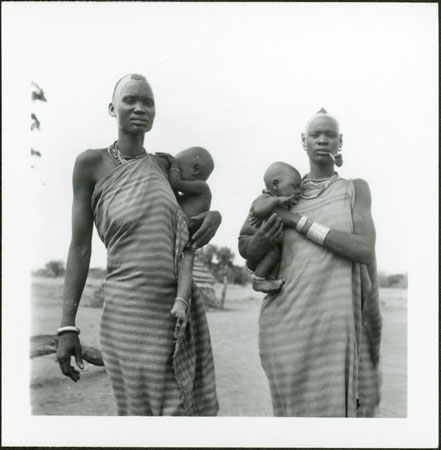Mandari women married to Dinka

55 x 53 mm | Print gelatin silver
Date of Print:
Unknown
Previous PRM Number:
JB.2.7
Accession Number:
1998.97.22.2
Description:
A three-quarter length portrait of two Dari clan women wearing body cloths (usual for married women) and carrying infants on their hips.
They are described as daughters of a Dari clan chief who have married prominent Aliab Dinka men.
Both Dari and Mokido clans had a high proportion of marriages to Aliab Dinka, from whom they could gain significant brideprice, enabling further good marriages for male family members.
The 'riverain' Mandari groups, that is Tsera and Köbora, did not intermarry with the Dinka, possibly since they had greater herds than the western Mandari.
However, since the Mandari were generally dispised by the Aliab, women were only married as second or third wives.
Mandari women likewise did not favour marriage to Aliab men, since they were poorly treated by Aliab women and were expected to do rough work such as building and hoeing, often or mostly male tasks in Mandari.
Such intermarriage had also built up a degree of dry-season usage of Mandari grazing grounds, especially in Mokido clan area which had the highest proportion of Dinka intermarriage.
Photographer:
Jean Carlile Buxton
Date of Photo:
1950 - 1952
Region:
[Southern Sudan] Bahr el Jebel Dari
Group:
Mandari Dari
PRM Source:
Ronald Carlile Buxton via Institute of Social and Cultural Anthropology
Acquired:
Donated 1988
Other Owners:
Jean Buxton Collection
Class:
Clothing , Toilet , Ornament , Narcotic , Child Care
Keyword:
Hair , Ornament Arm , Pipe
Documentation:
See Related Documents File. Buxton field notebooks in Tylor Library.
Other Information:
In Some Notes on the Mandari of Equatoria Province, A.E.
Sudan, (typescript notebook of c.1951 in Tylor Library, Institute of Social and Cultural Anthropology, University of Oxford), book IV, page 493,500 Jean Buxton notes that 'Mandari are always complaining about the way in which the most attractive girls are married to Dinka for high prices, but when it comes to the opportunity of getting such prices for their own girls, the very people who complain are the first to jump at the offer...The Sere Mandari do not marry their daughters to the Dinka like the Boronga...Mandari girls are used to a high standard of food and, in a sense, of comfort too, in that no Mandari woman is expected to do rough work like building huts, and the men do a great deal of the work in the fields.
In Dinka, on the other hand, women do all the building and the major part of the work on the cultivations...For this reason Mandari girls do not like marrying Dinka.
Life is hard, they feel lonely, and are not always well treated by fellow wives and in-laws...They are usually married as second or junior wives, and I have never heard of a Mandari girl being married as a first wife.' [Chris Morton 3/11/2004]
Recorder:
Christopher Morton 3/11/2004 [Southern Sudan Project]

